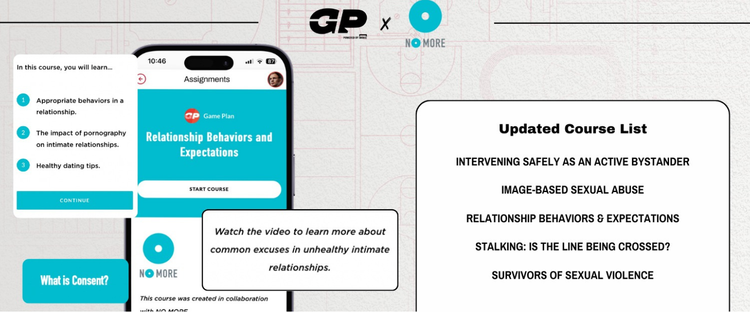Know how to respond...

You think a friend or family member is in an abusive or unhealthy relationship. What do you do?
Once you recognize the warning signs that a situation might be abusive, you can then identify how to respond in a way that feels appropriate and comfortable.
Talk privately with the victim, and express concern by saying you’ve been worried about them. Listen without judgment and if they don’t want to talk, then let them know that you’ll be there for them if they ever do want to talk.
TIP→ Enable the survivor to make their own decisions.
Personal style, culture, and context of the survivor’s life may affect their reactions. A survivor may not be comfortable identifying as a victim or naming their experience as abuse or assault, and it is essential to respect each person’s choices and style of coping with this traumatic event.
Listening without judgment may make them feel comfortable opening up, and if they do disclose abuse, let them know you believe them. You can reassure them that they are not alone, this is not their fault, and you are here to help. Some useful things to say might be, “No one deserves to be treated this way,” “You are not to blame,” or “What’s happening is not your fault.”
TIP→ It’s essential to focus on the feelings and reactions of the survivor
Remember that although you may be having a strong reaction to what happened, it’s essential to focus on the feelings and reactions of the survivor rather than your own. Try not to outwardly judge or confront the abuser, as it may make the situation worse or more dangerous for the victim and could put you in danger too.
Offer options by letting them know free, confidential resources are available and that you are here to support them in whatever choices they make. National hotline services include the National Domestic Violence Hotline 1.800.799.7233 (www.thehotline.org), RAINN for support with sexual assault on 1.800.656 4673 (HOPE) https://www.rainn.org/ and loveisrespect for younger survivors on 1.866.331.9474 (www.loveisrespect.org or text ‘loveis’ to 22522). They can offer you guidance and point you to local resources in your area that will help keep you and your children safe.
TIP→ Offer to help with the practical stuff
Offer to let them use your phone or computer to look up local resources or contact someone who can help them and any children involved.
Your friend tells you that they were raped. What do you do?
The support survivors of sexual assault receive from the people they love, and trust can be invaluable to their ability to cope with and heal from sexual assault.
Listen
Allow your friend to talk about what happened and control the direction of the conversation. Don’t ask a lot of questions or focus on the attack itself, but instead on how they are handling the trauma.
Listen Without Giving Advice or Trying to “Fix” Things
When we care for someone, we often try to give advice, solve their problems or fix things for them. While it comes from a place of caring, our instinct to try to problem-solve or give advice can sometimes leave a survivor feeling as though their emotions are being dismissed. Sometimes, the issues a survivor is having will not feel fixable to them or to you, and it’s much more helpful to just be there to listen to whatever a survivor wants to share with you.
Let the Survivor Have Control
Allow survivors to make decisions for themselves and assure them that their decisions are supported. You don’t have to agree with their decisions but it is important to give them the authority to decide how they will handle things.
Believe Them
It is important that the survivor knows you believe what happened.
Normalize A Survivor’s Feelings
Every survivor will react to their experience differently. Survivors may experience many upsetting, conflicting, confusing feelings after an assault. Survivors often re-experience the event through flashbacks, may feel on edge all the time, or may be prone to sudden outbursts, which can feel incredibly upsetting and leave a survivor feeling even more disempowered. Some survivors may blame themselves for and feel frustrated by these intense feelings. It’s essential to remind a survivor these feelings and responses are out of their control and are the body’s way of responding to a traumatic event. Something helpful you could say would be, “You are having a normal response to an abnormal situation.“
Provide Unconditional Support
It will help your friend to hear that they are not to blame for the assault. Regardless of an individual’s choices prior to the attack, no one ever asks to be or deserves to be raped or sexually assaulted.
Be Patient
Healing takes time, and every survivor copes with trauma differently. Don’t pressure or rush your friend to be “normal” or to “just move on.” Instead, reassure them that support from you will be available throughout the healing process, however long it may take.
Let The Survivor Know that Help is Available
If they are interested and open to receiving assistance, tell them about the National Sexual Assault Hotline or offer to help find local services for them.
Supporting A Survivor
Supporting a survivor can feel challenging for a number of reasons: you may be worried about upsetting the survivor, you may have other personal experiences with this issue, or you may feel you don’t know what to say at all. The most important things you can do for a survivor are to listen, validate, ask how you can help, know where to refer a survivor for further help, listen without judgment, and care for yourself.
Make Sure You Are Getting the Support You Need
Watching a friend or loved one work through the aftermath of a sexual assault can be an extremely difficult and painful experience. Common feelings of those supporting someone who has been assaulted include helplessness, frustration, anger, and guilt. It can be helpful to talk with someone other than the survivor about these feelings.
TIP→ Get help for yourself
You understandably may be experiencing discomfort, shock or uncertainty and have a lot of questions. To respect the survivor’s discomfort and give yourself the space you need to process your own feelings, wait until you’re away from the survivor and call the National Sexual Assault Hotline for free, confidential support.
Where to get help
Read moreTogether We Can End Domestic and Sexual Violence






